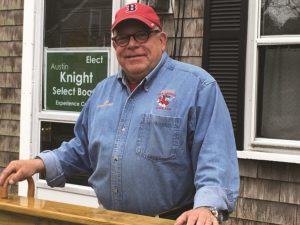PROVINCETOWN — Austin Knight is running on his record — and it’s quite a record. He’s been elected to the select board three times, in 2007, 2010, and 2013. He served as chair for almost three of his seven years, he said.

He resigned from the board in 2014, just before a recall petition with more than 300 signatures was certified. He had lost his first election campaign in 2004, and he lost in a comeback attempt in 2020.
That means May 9 will be the sixth time Knight, 65, has been a candidate for a seat on Provincetown’s select board. If he wins, it will be his fourth term in office. If he loses, it would be something like his fourth defeat, depending on how one scores the events of 2014.
“I think I have a lot to offer still,” Knight said. “I think I bring a lot to the table, and we’ll see what happens.”
Knight’s first priority is budgets. The town was in real financial danger when he was elected in 2007, he said, and he kept a close eye on finances throughout his time in office. With the town now flush with rooms tax and marijuana tax revenues, Knight said it is important to use that money on “long-term situations rather than short-term fixes.”
Pointing to his past efforts, Knight described breaking an expensive town hall renovation project into two parts so that voters could see the success of the exterior work before they had to vote for the interior fixes. He once withheld support of the school budget in order to secure a study of whether Provincetown High School could adequately prepare its students for college.
“Some school members were pretty upset with me, but they agreed on town meeting floor that we should have the study,” he said.
That study recommended a gradual closure of Provincetown High School, a choice the school committee wound up supporting in 2010 — tearfully, but unanimously.
Knight also said that the dune the town is trying to build behind Tin Pan Alley to block coastal flooding is a waste of money.
“It’s not going to work,” he said. “The ocean is much greater than sand. Go look at Race Point if you want to see sand shift.” Knight said something with “more substance” would be needed — something more like the breakwater in Provincetown’s East End, near Snail Road.
“I think we have to follow the example of New Jersey and put more breakwaters in,” Knight said. “You have it in the East End, you have it in the center of town — they may have to line the whole shore with a breakwater, although then you force the water to either edge and Truro is gonna get wiped out.”
In addition to his commitment to saving money for the town, Knight said he would bring communication skills to the board. The evidence, he said, is his experience negotiating the town’s purchase of the VFW building.
“When we purchased the VFW, I negotiated that deal,” Knight said. “We had a goal initially of a police station with housing, but housing was always part of that deal.”
Ultimately, whether the police station should be put on the VFW site or across the street from it became a divisive question, with two town meetings in 2019 consumed by the subject.
“When I left the board in 2014, I told the other board members, every year you wait on this police station will cost another million dollars,” Knight said. “And it was true.”
According to news reports at the time, Knight’s resignation in 2014 stemmed from events around his reelection campaign in 2013. Then-Police Chief Jeff Jaran sent current Police Chief Jim Golden, then a lieutenant, to take campaign signs from Knight’s garage on Miller Hill Road.
Knight had told Jaran where the signs were, he said. But he also said he did not know at the time that Golden or any other police officer had gone to fetch them.
A formal investigation later found that Jaran had, in fact, directed his officers to vote for Knight, and Jaran was fired in December 2013. The investigation also found that Knight “knew that the signs would be distributed to Provincetown police officers.”
His mother was diagnosed with cancer in January 2014, and Knight said he did not have the energy to both care for his mother and battle a recall. He resigned later that month. Ever-mindful of town finances, he added, he wrote his resignation to be effective on the day before town election in May — so the town would not have to pay for a separate election to fill his vacated seat.





